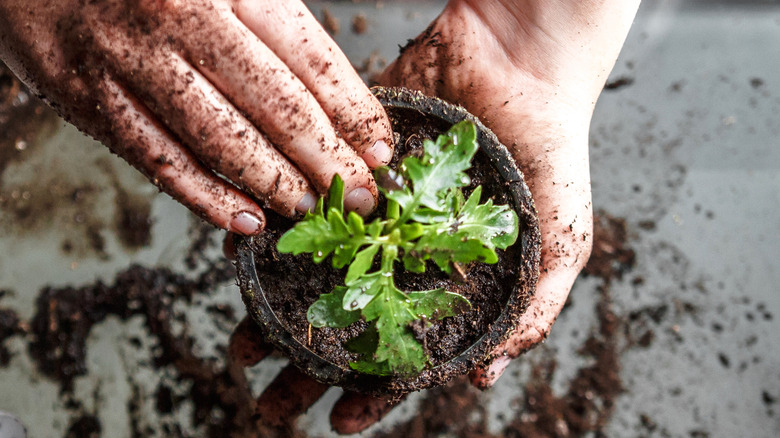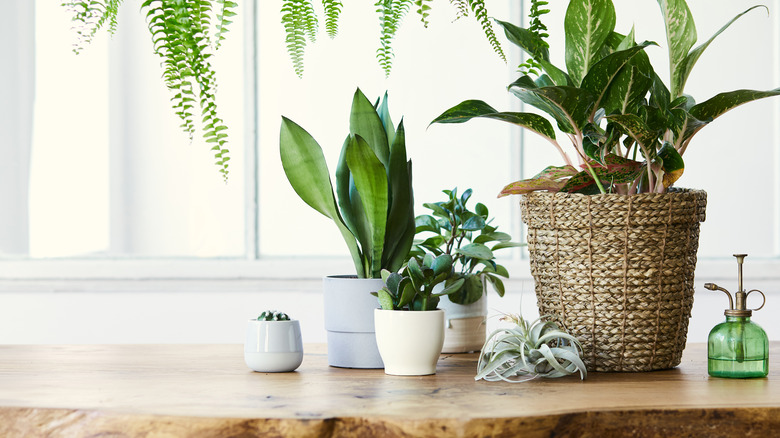Can Playing Music For Plants Really Have An Effect On Their Growth?
Plants really are marvels of nature. As any gardener will tell you, the tiniest and most shriveled-up of seeds can become, with a little care and attention, towering and majestic plants. According to Guinness World Records, the record for the world's tallest sunflower was claimed in August 2014 by a glorious specimen that measured just over 30 feet tall. It was grown by one Hans-Peter Schiffer, who had previously claimed the same record twice before.
By the same token, though, sometimes the hardiest-seeming plants just appear to decide enough is enough, and shrivel into nothing out of nowhere. Some people, like Schiffer, seem to have a way with plants, while others just can't find a way to grow them. Apparently, an element of luck is involved.
It helps, of course, to be attuned to a plant's needs: to diligently water them when needed, to carefully prune and trim, to repot. There are a lot of tools available in a gardener's arsenal. Music, for some, is considered one of them, and it appears that it really can bolster a plant's growth to play music for it.
Classical music or rock music?
Via Science Direct, a May 2020 study published in the journal Neurobiology of Learning and Memory indicates that the work of Vivaldi, Chopin, and Beethoven can have beneficial effects on students' abilities to reactivate memories while sleeping, something which may be useful when, for example, preparing for a test. What about plants, though? Well, our leafy friends also seem to be bolstered by music's influence as well. They also appear to be very selective.
You Had Me At Gardening states that the pores of plants are energized by certain types of sounds, as are the cells themselves. In its own experiment, the outlet exposed plants to classical music and others to rock music, and compared the results. The conclusion? Both genres positively affect plant growth, but classical was more effective in doing so. However, the rock-listening plants' leaves appeared to fare better health-wise, even though their growth was apparently slower.
Published on Researchgate, the December 2015 study "Effect of Music on Plants — An Overview" from Anindita Roy Chowdhury et al reports that music is a stimulus like any other, and that plants, being very much alive, seem to respond to it, too.
Turn that down, it's just noise
Via Researchgate, "Effect of Music on Plants — An Overview" from Anindita Roy Chowdhury et al reports that an experiment was conducted using marigold plants. They were divided into three groups of two plants. Of the groups, one was played the acoustic frequency "Light Indian Music" for four-hour blocks for a month, and the other was played no sound. A second pair of plants was played "Meditation Music" and no sound for the same period, and the last two were played a discordant frequency dubbed "Noise" and no sound.
Levels of water, light, and so on were kept consistent, and growth was meticulously documented every week. The findings were illuminating. The plant that enjoyed "Light Indian Music" grew taller than the one that heard silence. Furthermore, "Number of buds and number of flowers were always higher on the treated plant. A particular leaf marked on each plant to monitor the growth also showed a higher gain in its length and hence in its area with exposure to music." The same was true of the "Meditation Music" plant.
The study concluded that plants listening to both genres of music grew more effectively. The plant that was exposed to "Noise" started to develop similarly, but its rate of growth soon plummeted. Its direction of growth changed dramatically: away from the direction of the sound. Plants, then, appear to love tuneful music, but persistent discordant sounds can have a negative effect.


